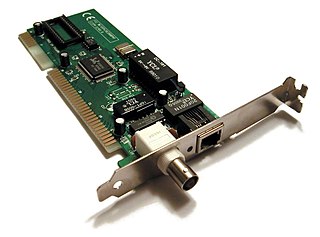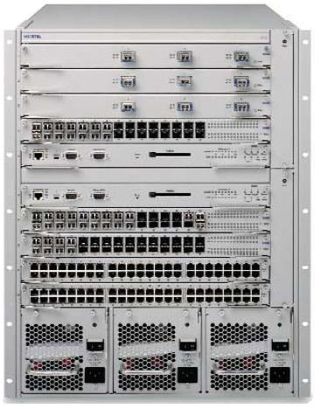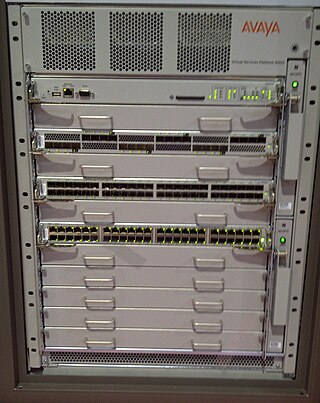
InfiniBand (IB) is a computer networking communications standard used in high-performance computing that features very high throughput and very low latency. It is used for data interconnect both among and within computers. InfiniBand is also used as either a direct or switched interconnect between servers and storage systems, as well as an interconnect between storage systems. It is designed to be scalable and uses a switched fabric network topology. Between 2014 and June 2016, it was the most commonly used interconnect in the TOP500 list of supercomputers.
Fibre Channel (FC) is a high-speed data transfer protocol providing in-order, lossless delivery of raw block data. Fibre Channel is primarily used to connect computer data storage to servers in storage area networks (SAN) in commercial data centers.

A network interface controller is a computer hardware component that connects a computer to a computer network.

Small Form-factor Pluggable (SFP) is a compact, hot-pluggable network interface module format used for both telecommunication and data communications applications. An SFP interface on networking hardware is a modular slot for a media-specific transceiver, such as for a fiber-optic cable or a copper cable. The advantage of using SFPs compared to fixed interfaces is that individual ports can be equipped with different types of transceivers as required, with the majority including optical line terminals, network cards, switches and routers.
Brocade was an American technology company specializing in storage networking products, now a subsidiary of Broadcom Inc. The company is known for its Fibre Channel storage networking products and technology. Prior to the acquisition, the company expanded into adjacent markets including a wide range of IP/Ethernet hardware and software products. Offerings included routers and network switches for data center, campus and carrier environments, IP storage network fabrics; Network Functions Virtualization (NFV) and software-defined networking (SDN) markets such as a commercial edition of the OpenDaylight Project controller; and network management software that spans physical and virtual devices.
The current portfolio of PowerConnect switches are now being offered as part of the Dell Networking brand: information on this page is an overview of all current and past PowerConnect switches as per August 2013, but any updates on current portfolio will be detailed on the Dell Networking page.

The Avaya Ethernet Routing Switch 8600 or ERS 8600, previously known as the Passport 8600 or the Accelar 8000, is a modular chassis combination hardware router and switch used in computer networking. The system, originally designed and manufactured by Nortel, was manufactured by Avaya from 2009 until 2017. The system provided the 10G Ethernet equipment backbone for the 2010 Winter Olympics games, providing service for 15,000 VoIP Phones, 40,000 Ethernet connections and supporting 1.8 million live spectators. The system is configurable as a 1.440 Terabit Switch cluster using SMLT and R-SMLT protocols, to provide high reliability cluster failover.
Dell Force10, was a United States company that developed and marketed 10 Gigabit and 40 Gigabit Ethernet switches for computer networking to corporate, educational, and governmental customers. It had offices in North America, Europe, and the Asia Pacific region.
The Cisco Nexus series switches are modular and fixed port network switches designed for the data center. Cisco Systems introduced the Nexus Series of switches on January 28, 2008. The first chassis in the Nexus 7000 family is a 10-slot chassis with two supervisor engine slots and eight I/O module slots at the front, as well as five crossbar switch fabric modules at the rear. Beside the Nexus 7000 there are also other models in the Nexus range.
IEEE 802.1aq is an amendment to the IEEE 802.1Q networking standard which adds support for Shortest Path Bridging (SPB). This technology is intended to simplify the creation and configuration of Ethernet networks while enabling multipath routing.

Avaya Virtual Services Platform 9000 Series or VSP 9000 is a set of modular chassis switches used in enterprise and data center networks, manufactured by Avaya. The VSP 9000 was targeted at institutions which were suffering from performance limitations, needed to simplify their network infrastructure in a virtualized environment, or required 10 Gigabit Ethernet with the option to scale to 40 or 100 Gigabit Ethernet. It is also an option for companies who are looking to reduce the power and cooling cost in order to maximize the cost-effectiveness of their infrastructures; this unit was also designed, and is expected, to have a lifespan of seven-to-ten years.
Avaya Ethernet Routing Switch 8800 Series or ERS 8800, is a range of modular chassis products that combine hardware router and switch used in computer networking, designed and manufactured by Avaya. When an ERS 8000 Chassis, a passive device in its own right, is equipped with the 8895 SF/CPU, this system is known as an Ethernet Routing Switch 8800; conversely, when equipped with an 8692 SF/CPU module the system is known as an Ethernet Routing Switch 8600.

The Dell blade server products are built around their M1000e enclosure that can hold their server blades, an embedded EqualLogic iSCSI storage area network and I/O modules including Ethernet, Fibre Channel and InfiniBand switches.
Avaya Virtual Services Platform 7000 Series or VSP 7000 is a set standalone/Stackable Switches, used in enterprise data networks, and data centers, manufactured by Avaya. This product is primarily offered to satisfy the Top-of-Rack (ToR) role for server farms and virtualized data centers. It supports Avaya's extended Shortest Path Bridging (SPB) implementation "Fabric Connect", and is future-ready for Edge Virtual Bridging (EVB) – IEEE 802.1Qbg, and Fiber Channel over Ethernet (FCoE). The system incorporates fifth generation application-specific integrated circuit (ASIC) chips with redundant and hot-swappable power supplies, fans, and expansion modules. The VSP 7000's unique architecture allows it to be meshed—fully or partially—with like devices, creating a high-capacity, low-latency network of up to 500 units, supporting up to 16,000 ports of 10GbE supported by a virtual backplane of up to 280 Tbit/s

Gnodal was a computer networking company headquartered in Bristol, UK. The company designed and sold network switches for datacenter, high-performance computing and high-frequency trading environments. Gnodal's products were based on its own Peta ASIC, which was the basis of a family of 1RU and 2RU 10 Gigabit Ethernet low latency switches, including the GS7200 switch. Gnodal's products ran a Linux-based network operating system, GnoS OS), which was based on Aricent's ISS product.

Ethernet Routing Switch 3500 series and Ethernet Routing Switch 2500 series or ERS 3500 and ERS 2500 in data computer networking terms are stackable routing switches designed and manufactured by Avaya.
Dell Networking is the name for the networking portfolio of Dell. In the first half of 2013, Dell started to rebrand their different existing networking product brands to Dell Networking. Dell Networking is the name for the networking equipment that was known as Dell PowerConnect, as well as the Force10 portfolio.
The Avaya Virtual Services Platform 4000 series are products that, in computer networking terms, are standalone switch/routers designed and manufactured by Avaya for Ethernet-based networks. The VSP 4000 hardware is a derivative of the earlier Ethernet routing switch 4000 series, leveraging certain shared components, but implementing a new, completely different, operating system derived from the virtual service platform 9000 series. The role of the VSP 4000 is to extend fabric-based network virtualization services to smaller, remote locations, thereby creating a single service delivery network.







